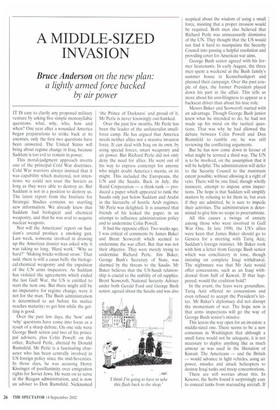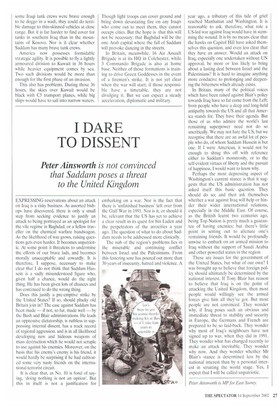A MIDDLE-SIZED INVASION
Bruce Anderson on the new plan:
a lightly anned force backed by air power
IT IS easy to clarify any proposed military venture by asking five simple monosyllabic questions: what, why, who, how and when? One year after a wounded America began preparations to strike back at its enemies, only the first two questions have been answered. The United States will bring about regime change in Iraq, because Saddam is too evil to remain in power.
This moral-judgment approach inverts one of the principal Cold War doctrines. Cold War warriors always insisted that it was capability which mattered, not intentions: we could not trust the Soviets as long as they were able to destroy us. But Saddam is not in a position to destroy us. The latest report from the Institute for Strategic Studies contains no startling new information. We already knew that Saddam had biological and chemical weaponry, and that he was avid to acquire nuclear weapons.
Nor will the Americans' report on Saddam's arsenal produce a smoking gun. Last week, someone involved in drawing up the American dossier was asked why it was taking so Jong. 'Hard work.' Why so hard? Making bricks without straw,' That said, there is still a casus belli: the biological/chemical weaponry and the expulsion of the UN arms inspectors. As Saddam has violated the agreements which ended the last Gulf War. the US is entitled to start the next one. But there might still be no imperative for regime change, were it not for the man. The Bush administration is determined to act before his malice reaches maturity; to get him while the getting is good.
Over the past few days, the 'how' and 'why' questions have come into focus as a result of a sharp debate. On one side were George Bush senior and two of his principal advisers, plus Colin Powell: on the other, Richard Perle, abetted by Donald Rumsfeld. Mr Perle is a fascinating character who has been centrally involved in US foreign policy since the mid-Seventies. In those days, he was accusing Henry Kissinger of pusillanimity over emigration rights for Soviet Jews. He went on to serve in the Reagan administration, and is now an adviser to Don Rumsfeld. Nicknamed 'the Prince of Darkness' and proud of it, Mr Perle is never knowingly out-hawked.
Over the past few months, Mr Perle has been the leader of the unilateralist smallforce camp. He has argued that America needs neither allies nor a massive invasion force. It can deal with Iraq on its own, by using special forces, smart weaponry and air power. But Richard Perle did not only deny the need for allies, He went out of his way to express contempt for anyone who might doubt America's merits, or its might. This included the Europeans, the UN and the Saudis. Back in July, the Rand Corporation — a think-tank — produced a paper which appeared to rank the Saudis only just below Saddam and Arafat in the hierarchy of hostile Arab regimes. Mr Perle was delighted. It is assumed that friends of his leaked the paper, in an attempt to influence administration policy and to undermine Colin Powell.
It had the opposite effect. Two weeks ago, I was critical of comments by James Baker and Brent Scowcroft which seemed to undermine the war effort. But that was not their objective. They were merely trying to undermine Richard Perle. Jim Baker, George Bush's Secretary of State, was alarmed by the threats to the Saudis. Mr Baker believes that the US-Saudi relationship is crucial to the stability of oil supplies. Brent Scowcroft, National Security Adviser under both Gerald Ford and George Bush senior, agreed about the Saudis and was also sceptical about the wisdom of using a small force, insisting that a proper invasion would be required. Both men also believed that Richard Perle was unnecessarily dismissive of the UN. They thought that the US would not find it hard to manipulate the Security Council into passing a helpful resolution and providing cover for American war aims.
George Bush senior agreed with his former lieutenants. In early August, the three men spent a weekend at the Bush family's summer house in Kennebunkport and planned their campaign. Over the past couple of days, the former President played down his part in the affair. This tells us more about his unwillingness to appear as a backseat driver than about his true role.
Messrs Baker and Seoul/croft started with an advantage. Though George Bush junior knew what he intended to do, he had not made up his mind on the tactical questions. That was why he had allowed the debate between Colin Powell and Don Rumsfeld to rumble on; he was still reviewing the conflicting arguments.
But he has now come down in favour of what might be termed a third way. The UN is to be involved, on the assumption that it will be helpful. The administration will defer to the Security Council to the maximum extent possible, without allowing it a right of veto. There will be one final, though wholly insincere, attempt to impose arms inspections. The hope is that Saddam will simplify matters by refusing to let them in, but even if they are admitted, he is sure to impede their activities. The administration is determined to give him no scope to procrastinate.
All this causes a twinge of anxiety among those who were involved in Gulf War One. In late 1990, the US's allies were keen that James Baker should go to Geneva for a meeting with Tariq Aziz, Saddam's foreign minister. Mr Baker took with him a letter from George Bush senior which was conciliatory in tone, though insisting on complete Iraqi withdrawal. The nightmare was that Mr Aziz would offer concessions, such as an Iraqi withdrawal from half of Kuwait. If that happened, would the coalition hold?
In the event, the fears were groundless. Tariq Aziz offered no concessions and even refused to accept the President's letter. Mr Baker's diplomacy did not disrupt the momentum of war. The hope now is that arms inspections will go the way of George Bush senior's missive.
This leaves the way open for an invasion: a middle-sized one. There seems to be a new consensus in Washington that although a small force would not be adequate, it is not necessary to deploy anything like as much armour as was used in the liberation of Kuwait. The Americans — and the British — would advance in light vehicles, using air power, missiles and attack helicopters to destroy Iraqi tanks and troop concentrations.
There are still worries about this. In Kosovo, the Serbs found it surprisingly easy to conceal tanks from marauding aircraft. If some Iraqi tank crews were brave enough to lie doggo in a wadi, they could do terrible damage to thin-skinned vehicles at close range. But it is far harder to find cover for tanks in southern Iraq than in the mountains of Kosovo. Nor is it clear whether Saddam has many brave tank crews.
America now possesses formidable strategic agility. It is possible to fly a lightly armoured division to Kuwait in 36 hours while heavier equipment comes by sea. Two such divisions would be more than enough for the first phase of an invasion.
This also has problems. During those 36 hours, the skies over Kuwait would be black with C5 transport planes, while big ships would have to sail into narrow waters. Though light troops can cover ground and bring down devastating fire on any Iraqis who come out to meet them, they cannot occupy cities. But the hope is that this will not be necessary: that Baghdad will be the one Arab capital where the fall of Saddam will provoke dancing in the streets.
In Britain, meanwhile. 16 Air Assault Brigade is at its HQ in Colchester, while 3 Commando Brigade is also at home base. Neither of those formations is training to drive Green Goddesses in the event of a firemen's strike. It is not yet clear when the war will start; if those responsible have a timetable, they are not divulging it. But we can expect a steady acceleration, diplomatic and military.











































































 Previous page
Previous page